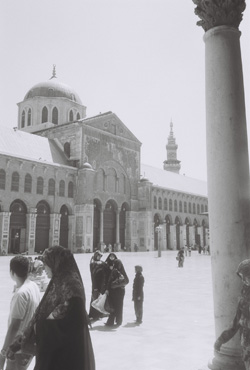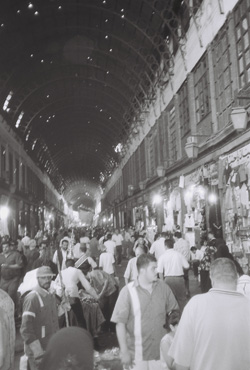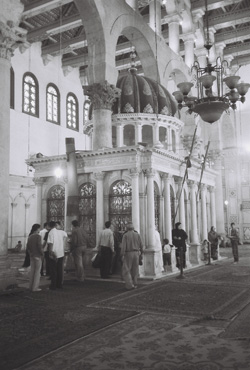Souq al-Hamidiyya
I didn’t expect to arrive in Damascus needing to search for War; I thought War would be waiting for me at the bus station.
Descending from the air-conditioned coach, which I boarded that morning in Aleppo, I stepped into a sweltering mid-day heat. The intense summer sun hung menacingly above as if it was meant only for me. Mid-day heat. It was a dry heat, though. As I turned and began to gather my bags from beneath the bus, I made a mental note that that statement – it’s a dry heat – which I had heard so often as a caveat to the region’s weather – hot, but bearable; light, as opposed to a heavy, wet blanket – should no longer be considered a cliché.
At the edge of the parking lot, newly arrived families greeted their kinfolk, friends reunited with friends, and taxi drivers gathered eagerly their fares – mostly university students and soldiers in fatigues returning home for the weekend – as if they were consuming the final wave of customers that would ever descend from Damascus-bound buses in this dusty space.
With the crash and push of arriving passengers dissipating quickly into a tranquil calm, I strode toward the margins of the lot as though I knew where I was heading and as if a family member, friend, or, maybe, War was waiting for me.
There wasn’t any sign of War, though.
I dropped my bags on the dusty, bleached white pavement, buckled and cracked by the heat and tonnage and approached a line of men. “Harb?” Then, “Abhath li Harb.” War? I’m searching for War.
Some smiled. One said unambiguously: “There is no war here.” Another looked me up and down and then, his gaze returning to my face, offered a somewhat perplexed but simple “No.”
The Arabic word for war is harb. And it so happened that the fixer, that is, the person who I had hired to help me with my reporting on the plight of Iraqi refugees in Syria – over one million of them and, at the time, increasing by thirty thousand each month – was named Harb. I had met Harb – briefly – while reporting in Iraq. At that time, he was working with another independent American reporter but since then had fled to Syria with his family.
He was supposed to meet me.
Harb was born in 1948, the year of al-nakbah, the Catastrophe, when roughly three quarters of a million Palestinians where displaced from their homeland as a result of the war that followed the founding of the State of Israel. His father nicknamed him harb, war, which Harb kept even now as a married man, and a father of three, on the threshold of sixty.
But the name is thick with irony, which became apparent only after spending long days with Harb, who frequently broke into song, particularly those of Fayrouz or Um Kalthoum, while we scoured the Syrian capital for stories. His unequivocal courtesy and boundless optimism betrayed any affinity with or tendency toward epic violence, especially involving tanks or aircraft.
This became clear only later, though.
At that moment, standing in the near empty parking lot, amidst the few remaining cab drivers and the mid-day heat, sweat beginning to build heavily under my light cotton shirt, I was just another American reporter in the Middle East desperately in search of war.
 Downtown Damascus |
Damascus, better known in the region as ash-sham, is a bustling metropolis of seven million people. It contends with nearby Aleppo for the honorific of oldest continually inhabited city in the world – somewhere around 8,000 years. While an abundance of functionalist modern architecture and familiar urban accoutrements in the city’s downtown mostly conceal its deep history, the stones that form the high ramparts encircling the Old City could exhale breathes hundreds, maybe thousands, of years old. As one archaeologist has noted: “The walls of Damascus hold more secrets than most.” Each stone could relate stories as old as the dirt from which it was excavated. It was from these walls that the Apostle Paul was supposedly lowered in a basket, escaping certain death, allowing him to continue spreading the words of a marginal prophet. So, too, from within these walls, Syria’s political prisoners have emerged from prolonged confinement and torture – a citadel on one edge serving as modern dungeon.
Crucial to the Old City’s continued vitality and the anchors to which its long history are bound are the Umayyad Mosque and the arcaded markets and crowed bazaars that radiate out from it.
The mosque, built by Caliph Khaled ibn al-Walid roughly a century after Muhammad’s flight from Mecca to Medina, sits upon the former site of a Roman temple to Jupiter, which itself replaced an earlier Aramaean temple to Haddad. A shrine to John the Baptist sits within the mosque’s main prayer area. Just outside its northwest corner, lies the tomb of Salah al-Din, who in 1187 took back Jerusalem from the Crusaders. Near another corner of the mosque lies the Jewish Quarter. Thus, Christians, Muslims, Jews and modern day Arab nationalists each have something to revere – a foundational greatness to celebrate and a past glory that might one day be renewed.
Walking from the mosque in any direction, one will file along a bustling souq, crowded with locals seeking out their wares, Iranian pilgrims destined for one of Islam’s holiest – and oldest – sites, a European archaeology buff or two, and the occasional Iraqi refugee situating themselves within their place of exile. Potent smells of coffee, tobacco, and automobile exhaust waft through the air. Mopeds and flatbed carts pulled by young boys cut through the thick crowds of shoppers and sightseers, the human wake collapsing quickly behind them once they pass. Before the soft ochre glow of shop stalls, a bounty of colorful tapestries hang above jars of herbs and spices as well as bins of dried fruits and nuts. This mixture teases into action all of one's senses. Along the Souq al-Hamidiyya, bright, narrow beams of yellow and orange light cut through small punctures in the arcaded roof-tops – reminders of French strafing runs over this market during one of the numerous Arab revolts after the First World War.
Adorning the stone and cement frontages of shops and alleyways throughout the Old City is a variety of poster portraits of Syria’s President Bashar al-Asad. The ophthalmologist turned political leader is accompanied frequently by way of Photoshop editing by Hizbullah’s Hassan Nasrallah and Iran’s President Mahmoud Ahmedi-nejad. In this oldest of Old Cities, where long-ago saints and contemporary political dissidents escaped death, the here and now mingles tightly with ash-sham’s long history.
“Have you seen the film The Blues Brothers?” It was an unexpected question given that it was posed by a mid-level bureaucrat at the Ministry of Information named Basil, who spoke with a crisp Oxbridge diction.
The day before, over coffee and breakfast at my hotel, I told Harb that I thought it would be a good idea if we went to the ministry in order to assuage the Syrian government’s inevitable fears of an American reporter poking around Damascus. My theory was that I would avoid a lot of hassle if I made it clear that my intention was not to write about the government’s jailing of political opponents or any other sensitive domestic topic but that instead I was reporting only on refugees fleeing America’s brutal war on the people of Iraq. I would go about my reporting unimpeded, I calculated, and the Syrians would avoid troubling themselves with needless questioning and detentions. Harb concurred.
It was, of course, a lie. I had, in fact, been planning to meet with a dissident activist in an effort to check the pulse of Syria’s political opposition. But there I was in the ministry office trying to convince Basil of my benign intentions and, hopefully, go about my work, spending as little time as possible under the microscope of Syrian government apparatchiks.
Basil was completely pre-occupied, though, with his American pop-culture references. “You know the scene where John Belushi and Dan Akroyd drive their car through the shopping mall,” he asked.
I nodded, feigning intense interest.
“This is what the United States is doing in the Middle East,” Basil continued urgently. “They are wreaking havoc everywhere at the same time claiming they are on a mission from God.” Pushing his wire-rimmed frames back to their secure place behind the bridge of his nose, he leaned back slowly – knowingly – in his chair.
Harb looked bored, taking a pull from the second, maybe third cigarette, that he had lit since we arrived less than half an hour before. Our visit was a necessary exercise in order to avoid a hassle with the Syrian state and Harb was initially fully on-board. Yet, Basil’s lecture was a heavy price to pay for our careful planning and Harb couldn’t keep up the thinnest façade of interest. And neither could I.
Basil was, of course, right. Yet he told us nothing new, despite his clever and unlikely deployment of out-dated cultural devices. Harb was, after-all, a refugee from Iraq and I had seen first-hand the devastation there following the American invasion. We had traveled to the ministry in an effort to avoid government intrusion but had ended up prisoners nevertheless to a bureaucrat with a fondness for Saturday Night Live greater than any American I knew.
***
|
The host led me through the bar’s crowded interior and seated me at a table occupied only by a slender, middle-aged man. I slid into a chair and said marhabah – hello. Bowing his head silently in recognition of my greeting, he blinked his heavy eyelids slowly, gently pulling smoke through the twisting hose of his water pipe, which rose from the floor next to him and gurgled to the rhythm of his drags.
Around us hung the thick aroma of apple-flavored tobacco. At other tables pairs of dice clattered across backgammon boards; gamers slammed their stones into place with conviction. There was an occasional click of an Amstel can being opened and a soft gluck-gluck of liquid falling into glass. A bottle of Johnnie Walker Red stood on every table.
The mezzanine level bar overlooked Martyr’s Square, a busy public plaza, bifurcated by a garbage strewn ditch, which, if one looked closely enough through the summer darkness, was carved by the remains of the Barada River, now reduced to a near trickle due to numerous dams and the heavy toll of irrigation projects upstream. On one edge, moneychangers hawked their services before the ornate window displays of numerous sweets shops, at another end stood the skeletal beginnings of a new ministry building.
I introduced myself to the reticent smoker, who in turn told me his name and that he was a refugee from Iraq – from Baghdad, from the Dora neighborhood on the southern edge of the capital, where the chock-a-block concrete buildings of the city’s center slowly diminish into farmlands. He said that he fled Iraq because his life had been threatened, that if he had not left, he would have been killed. He told me that they blew up his home in order to hasten his decision.
They. Them. The others, who were not there before, he said. Before.
The waiter arrived with beers, popped them open with a click, and poured them into glass.
My companion was targeted because he was Sunni. But his greatest error was that he taught ballet.
“Who are these people who cannot appreciate dance and music,” he asked. “It is part of our culture, our civilization.”
Then, he turned his gaze toward the window, staring with half-drunken eyes upon the bustling weekend crowds below, which circled Martyr’s Square.
 Umayyad Mosque |
The UN’s refugee center is located in a converted warehouse a few miles outside of Damascus in a town called Douma. Outside the compound, a hundred Iraqis waited in the dust and heat for the opportunity to pass through its high walls and register with the agency as refugees. Inside, another couple of hundred displaced persons waited patiently to meet with UN staff. Most had experienced violence against them in some form – either from Americans or from one type of Iraqi militia or another: Salafist fundos and Shia fighters dressed in the all black of the Mahdi Army or the official uniforms of the Interior Ministry. The great majority had only enough money for three months of food and rent before becoming completely destitute. Jobs were scarce and prostitution among girls as young as thirteen was on the rise.
Underneath a large metal awning, where adults sat in metal chairs while waiting for their scheduled appointments with UN staff, was a spacious children’s play area. The UN worker that guided Harb and I through the compound admired it greatly. She delved into details about its construction and therapeutic role with nearly as much specificity as during her rundown of refugees’ birthplaces, duration of stay in Syria, and why they fled Iraq. Some Iraqis I spoke with later pointed out that their children weren’t traumatized due to a lack of plastic toys.
We continued through the compound and our host escorted us into a meeting already underway between an intake worker and a newly arrived Iraqi family. We sat listening as the UN employee, complete with a standard blue UN baseball hat, ran through a litany of mediocre questions before asking the couple about what compelled them to leave Iraq. Satisfied with the family’s response, the worker filled out some forms, handed them to the couple and explained that the agency acknowledged the family’s refugee status.
“Now you are officially homeless!” announced Harb, with typical, ironic cheer.
The couple smiled half-heartedly as their children squirmed within their arms.
I asked the couple if they had time to answer a few questions, explaining that I was an American journalist writing a story on the plight of Iraqi refugees in Syria.
The man paused and, looking somewhat shocked my question, answered: “It’s not even worth talking about because all the world knows what the problem is. The Syrians – our brothers – open up their doors to us. But we want to go home. I have dignity. If you could afford to take care of my family, I would go back to Iraq and fight for my country. There’s no electricity, no services. Every day I see twenty dead bodies in my neighborhood.” Exasperated, he paused and continued to gathering up his children.
As I wrote, struggling to keep pace with his response, he added before making his way out of the UN cubicle: “We will return to Iraq and fight the Americans.” His wife looked on smiling. And, as some final bit of contextualization, he said: “They kill our children.”
Harb sat staring at me as if to say: what did you expect. The family left and Harb and I waited for the next group of refugees to enter. I wondered if that small boy, cradled in his father’s arms, would also be know as Harb. With a million refugees in Syria it was certain that many would be marked by war if not in name then certainly by dint of their life experience.

